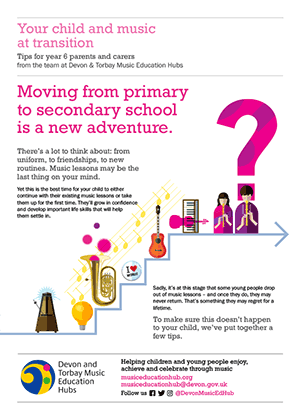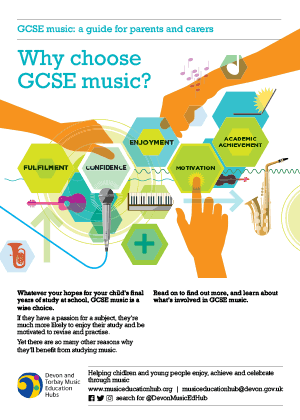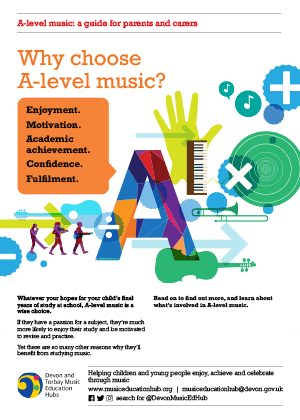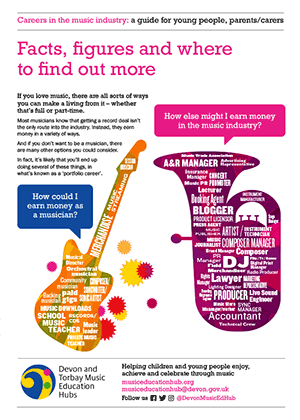Why Music?
We are delighted to be working with colleagues at Wiltshire Music Connect to create a range of customised resources to explain why music matters to children and young people.
On this page:
- Printable leaflets
- Your child and music at transition
- Why music at KS4?
- Why choose GCSE music?
- Why choose A-level music?
- Careers in the music industry
Most people know that music is a ‘good thing’. Research proves again and again that it is so important to children and young people’s lives and futures. Why? Because music education …
- increases confidence and self-esteem – which has a knock-on effect in all areas of their life and learning
- improves health and wellbeing – reducing stress, increasing a sense of wellbeing and happiness
- provides important life and social skills – such as listening, concentration, working as a team
- develops creativity and self-expression – helping young people to think differently and develop their power of imagination
- improves cognition, literacy and numeracy – recent neuroscience research has shown that children who learn an instrument have higher levels of cognitive capacity, specifically in their language acquisition and numerical problem-solving skills
- can be the key to unlocking potential – particularly for young people who are strongly creative, or who struggle to engage with other areas of learning
Printable leaflets
Your child and music at transition
Tips for year 6 parents and carers from the team at Devon Music Education Hub
Moving from primary to secondary school is a new adventure.
There’s a lot to think about: from uniform, to friendships, to new routines. Music lessons may be the last thing on your mind. Yet this is the best time for your child to either continue with their existing music lessons or take them up for the first time. They’ll grow in confidence and develop important life skills that will help them settle in. Sadly, it’s at this stage that some young people drop out of music lessons – and once they do, they may never return. That’s something they may regret for a lifetime.
To make sure this doesn’t happen to your child, we’ve put together a few tips.
What you can do
- If your child already has an instrumental/vocal tutor, ask them about lessons in secondary school
They may know which instrumental/vocal tutors teach at your child’s future secondary school. Many tutors know each other. If you’re keen to remain with your current tutor, ask them if they teach privately. - If they don’t, now’s a great time to consider learning. Ask about music at your secondary school parents evening or open day
Often the head of music/performing arts, music teacher/s, or instrumental/vocal tutors will be on hand to answer any questions. If cost is a concern, you can ask the school about any subsidies available for lessons and whether they also access our bursary and instrument hire schemes. - Look for the music lesson information in your child’s induction pack
Schools will usually ask you to sign up for music lessons the term before they start secondary school. Leaving it too late may mean there are no spaces left or your child is allocated lessons in their second or third choice of instrument. Make sure to sign up as soon as possible. - What if lessons on offer aren’t appealing?
Schools can’t cater for everyone’s preferences, but it’s important that there’s something that could spark your child’s interest. If what’s on offer at school isn’t appealing, tell the school. Chances are that other pupils are feeling the same. - Find out about other opportunities to learn and make music through school, within and outside the curriculum
Ask at parents evening about how often curriculum music takes place, and for how long. Ask about other opportunities like lunchtime or after-school clubs, performances, links with other organisations like local music centres, festivals, or groups/ensembles. Sign up for our Hubdates for local, regional and national opportunities. - Ask if they know about support for schools from the Hub
We support over 90% of Devon schools with one or more of the following:- Advice and support from a dedicated local Music Development Lead
- Delegated Music Education Grant (MEG) funding for each school
- Instrumental and vocal tuition bursaries
- Fully funded access to instruments and award- winning digital resources
- An extensive range of live music events and workshops
- Regular conference, training and networking opportunities for the music education workforce
Supporting your child in music: an investment in unlocking their potential
Most people know that music is a ‘good thing’. Research proves again and again that it is so important to children and young people’s lives and futures.
Why? Because music education …
- increases confidence and self-esteem
which has a knock-on effect in all areas of their life and learning - improves health and wellbeing
reducing stress, increasing a sense of wellbeing and happiness - provides important life and social skills
such as listening, concentration, working as a team - develops creativity and self-expression
helping young people to think differently and develop their power of imagination - improves cognition, literacy and numeracy
recent neuroscience research has shown that children who learn an instrument have higher levels of cognitive capacity, specifically in their language acquisition and numerical problem solving skills - can be the key to unlocking potential
particularly for young people who are strongly creative, or who struggle to engage with other areas of learning
Why music at KS4?
Why choose GCSE music?
Whatever your hopes for your child’s final years of study at school, GCSE music is a wise choice.
If they have a passion for a subject, they’re much more likely to enjoy their study and be motivated to revise and practise. Yet there are so many other reasons why they’ll benefit from studying music.
What are the benefits of GCSE music?
Music will provide transferable skills.
GCSE music involves written, analytical, practical and social/personal skills such as:
- independent learning: having to be disciplined about practising on their instrument or voice
- team working: particularly if they’re involved in weekly groups or ensembles, concerts and performances
- performance and presentation skills which are useful for any job/career
- listening: this is highly developed in musicians and it is an important part of the course
- analytical and essay-writing skills
- confidence and self-esteem: which has a knock-on effect in all areas of life and learning
- creativity and self-expression: helping young people to think differently and harness the power of their imagination
Find out more about the benefits of music:
www.wiltshiremusicconnect.org.uk/whymusic
Making music can help a young person maintain good mental health during a time of high pressure.
Research has shown that music can improve mood and prompt creative flow, which helps with anxiety and self- doubt. It can also help young people to regulate their emotions.
Both employers and universities see creative subjects as assets
Increasingly, employers and universities are looking for young people who have skills that are learned through creative subjects: creative thinking, emotional intelligence, adaptability, communication and tenacity to name just a few3. And universities are keen to attract students who have a well-rounded education and achieve good results, no matter what the subject.
There is usually only one exam – the rest is course work.
This takes the pressure off revision during those critical weeks where they will have many other exams.
Music is an academic subject in its own right, but it actually benefits other subjects too.
A recent study in the UK found that playing a musical instrument appears to enhance general performance in other subjects at GCSE4. Other studies have shown that music benefits learning by activating all areas of the brain5; auditory (sound processing); motor (rhythm processing); and limbic (emotions).
So by choosing music, your child could actually be improving their chances of doing well in their other subjects – including those within the Ebacc.
Studying music at GCSE goes beyond the enjoyment of creating and appreciating music – it fosters creativity, critical thinking, and discipline. It’s not just about notes and rhythms; music enhances overall academic skills and positively contributes to emotional well-being. Choosing GCSE music can unleash your creative potential and broaden your horizons in both academic success and personal fulfilment!
Studying music opens doors to many opportunities. Don’t let them close before your child has a chance to explore.
FAQs about GCSE music
Each school has different criteria and approaches. Do talk to the Head of Music/Performing Arts to find out the specifics for your child’s school.
What standard do students need to have reached?
Ideally, they’ll need to be Grade 3 or 4 standard on an instrument (or voice) by the end of the course or have equivalent skills in music technology / digital music making.
Can a student take music if they’re not currently having instrumental lessons?
Ideally they’ll have lessons, but exceptions can be made if they’re at a high standard and practise regularly, particularly for vocalists. If money is an issue, ask your school about the financial assistance available.
Learning to play a musical instrument can be expensive, but there is support available for children and young from low- income backgrounds:
See www.musiceducationhub.org/site/parents-carers/funding-and-remissions/
What if my child doesn’t read music, having learnt by ear?
Schools will teach the skills required to succeed as part of the course. For the Performing and Composing units there are alternatives to using score notation – it is not a necessity.
What if students don’t play an instrument or sing, but use music technology, or rap/beatbox?
It’s still possible to take GCSE music, as these are all options on every GCSE music specification – but this will vary from school to school.
Would students be able to do A-level music if they don’t take GCSE?
Possibly. They are more likely to be able to if they continue learning music outside of school. However, the decision will ultimately rest with the Head of Music/Performing Arts, so talk to them to find out.
What does the course cover?
There are usually three main areas of study: Performance, Composition, Listening and Appraising. Students will learn about a range of types of music, including vocal, instrumental, music for film, pop, jazz, fusion, and new music.
-
Performance
30% of final score.
Students give a performance for a minimum four minutes, including at least one minute of a group piece (ensemble playing). -
Composition
30% of final score.
Students create two compositions. In the first year of the course, they compose a piece of their choice. In the second, the piece is set by the exam board, usually from a choice of options. -
Listening and appraising/understanding
40% of the final score.
This is the only exam and is usually one and a half hours. Students are asked to listen to, and answer questions about, set works they’ve studied during the course. They then do the same for previously unheard pieces.
When will we need to apply?
Most schools have GCSE information evenings in the spring term of the academic year before students start their GCSEs. You’ll probably need to apply for the course in the Feb/March before the course starts.
Often, schools won’t know if they will have enough students to be able to run the course, until they have received everyone’s applications.
Where could GCSE music lead?
If students continue with their studies, they could choose from a range of different subjects.
They may choose to continue with music, by studying A-level or BTEC music or performing arts. But equally, they might want to study other subjects. Either way, choosing music at GCSE will have benefited them because it provides transferable skills.
If students don’t want to study music beyond GCSE, it is still a smart choice.
It can open doors to a range of education and employment pathways in:
-
Music
Being a musician isn’t the only career in music – other options include being a sound technician, community musician, music therapist, teacher, or private tutor, or a range of careers in the music industry, in a concert hall or music venue.
-
The arts/creative industries
This might include work in film, TV, theatre, radio, arts administration, or creative education.
-
Professions such as medicine, law, accountancy
Music is highly regarded as an academic subject and so could complement your other studies in leading to a professional career.
-
Any other pathway a young person might choose
GCSE Music provides a range of transferable skills that will provide a good foundation, whatever pathway your child chooses.
Students in Wiltshire have gone on to many and varied pathways following GCSE music, ranging from primary school teacher to mountain leader!
Myth busted: Music does not stop you getting into a profession such as law or medicine.
Why choose A-level music?
- Enjoyment
- Motivation
- Academic achievement
- Confidence
- Fulfilment
Whatever your hopes for your child’s final years of study at school, A-level music is a wise choice.
If they have a passion for a subject, they’re much more likely to enjoy their study and be motivated to revise and practise.
Yet there are so many other reasons why they’ll benefit from studying music.
What are the benefits of A-level music?
It is an academic subject which counts towards any university course.
As a concerned parent or carer, you may believe that music won’t be taken seriously by universities. Sometimes teachers of other subjects might imply this too. This is not the case. A-level music is a rigorous academic subject which sets students up well for university study, and universities are aware of this.
Also, ABRSM qualifications count towards the UCAS points required for university.
A number of studies have shown that music benefits learning by activating all areas of the brain: auditory (sound processing); motor (rhythm processing); limbic (emotions).
Myth busted: Taking A-level music will NOT have a detrimental effect on your child’s application for particular universities/ courses.
It will provide transferable skills
A-level music involves written, analytical, practical and social/personal skills such as:
- independent learning: having to be disciplined about practise
- team working: particularly if they’re involved in weekly groups or ensembles, concerts and performances
- performance and presentation skills: which are useful for any job/career
- listening: these are highly developed in musicians and it is an important part of the course
- analytical and essay-writing skills
- confidence and self-esteem: which has a knock-on effect in all areas of life and learning
- creativity and self-expression: helping young people to think differently and harness the power of their imagination
Making music can help a young person maintain good mental health during a time of high pressure and anxiety.
Research has shown that music can improve mood and prompt creative flow, which helps with anxiety and self- doubt. It can also help young people to regulate their emotions.
There is usually only one exam – the rest is course work.
This takes the pressure off revision during those critical weeks where they will have many other exams.
Finally, and perhaps most importantly: students are more likely to succeed and achieve a higher grade if they study something they are good at, and enjoy.
Studying music opens doors to many opportunities. Don’t let them close before your child has a chance to explore.
FAQs about A-level music
Each school has different criteria and approaches. Do talk to the Head of Music/Performing Arts to find out the specifics for your child’s school.
What standard do students have to have reached/what qualifications do they need?
Generally, students will need to have GCSE music at grade 5 or 6 (eg B grade) or equivalent (eg BTEC level 2, Rockschool, etc). There may be exceptions – for example if they’ve achieved a high standard on their instrument, but couldn’t choose music GCSE because of subject clashes.
Ideally, they’ll be Grade 4/5 standard on an instrument (or voice) and be able to reach Grade 6/7 by the end of the course.
Myth busted: Your child DOES NOT have to have reached Grade 8.
Is it essential to have instrumental lessons?
Ideally they’ll have lessons, but exceptions can be made if they’re at a high standard and practise regularly, particularly for vocalists. If money is an issue, ask your school about the financial assistance available.
Learning to play a musical instrument can be expensive, but there is support available for children and young from low- income backgrounds: See www.musiceducationhub.org/site/parents-carers/ funding-and-remissions/.
What if students don’t read music, having learnt by ear?
Reading music is a core skill required by A Level Music courses, particularly for the Listening & Appraising unit. Many schools will allow a student who can’t read music to take A-level but may put in early steps to build this skill quickly. The Composing unit does not require students to work with notation, as sequencing software such as Logic Pro can be used instead.’
What if students don’t play an instrument or sing, but use music technology, or rap/beatbox?
For some A Level courses, the Performance unit can be be achieved using music technology or rap. However, this will vary across schools, so we advise that you check first. It might also be worth considering A Level Music Technology or BTEC Level 3 Music which may be more suitable.
What subjects will it go well with?
Music is very mathematical in nature, and so Music and Maths complement each other well, so do Music and Languages – after all, music is a language in its own right.
In fact, Music goes well with pretty much any subject and some people believe that studying music can actually enhance your grades in other subjects.
What does the course cover?
Details – including the percentage weighting of the different elements – may vary, depending on which exam board the school uses.
However there are usually three main areas of study: Performance, Composition, Listening and appraising
Students will learn about a range of types of music, including vocal, instrumental, music for film, pop, jazz, fusion, and new music.
-
Performance
30% of final score.
Students give a performance of eight to twelve minutes (around three pieces) in the final year of studies. This can be a solo or group piece and include varied repertoire (eg different composers, a range of genres). -
Composition
30% of final score.
Students create two compositions. In the first year of the course, they compose a piece of their choice. In the second, the piece is set by the exam board, usually from a choice of options. Examples include: ‘Compose a theme and variations on a theme of x, y or z’; ‘Arrange a song for a choir at a wedding.’ -
Listening and appraising/understanding
40% of the final score.
This is the only exam and is usually two hours. Students are asked to listen to, and answer questions about, set works they’ve studied during the course. They then do the same for previously unheard pieces and may be asked to complete a score for one of the pieces.
When will we need to apply?
Most schools have A-level information evenings in the autumn before students start their A-levels. You’ll probably need to apply for the course in the January before the course starts.
Often, schools won’t know if they will have enough students to be able to run the course, until they have received everyone’s applications. Even then, they may not know until the August GCSE results.
The more people that apply, the more likely it is that the course will run.
Where could A-level music lead?
It could lead to a Music degree. Here’s what Oxford University says about theirs:
The varied nature of the course enables students to develop highly desirable skills in areas such as self-management, creativity, data analysis, performance, teamwork, problem-solving, and communication, all of which makes them an attractive prospect for potential employers... other popular destinations for Music graduates... include broadcasting, publishing, law, politics and the Civil Service. Rather than limiting your career prospects, a music degree opens doors to a wide range of careers.
If you don’t want to be a musician or study music at University, A-level music is still a smart choice.
It can open doors to a range of education and employment pathways in:
-
Music
Being a musician isn’t the only career in music – other options include being a sound technician, community musician, music therapist, teacher, or private tutor, or a range of careers in the music industry, in a concert hall or music venue.
-
The arts/creative industries
This might include work in film, TV, theatre, radio, arts administration, or creative education.
-
Professions such as medicine, law, accountancy
Music is highly regarded as an academic subject and so could complement your other studies in leading to a professional career.
-
Any other pathway a young person might choose
A-level music provides a range of transferable skills that will provide a good foundation, whatever pathway you choose.
Myth busted: Music does not stop you getting into a profession such as law or medicine.
Careers in the music industry: a guide for young people, parents/carers
Facts, figures and where to find out more
If you love music, there are all sorts of ways you can make a living from it – whether that’s full or part-time.
Most musicians know that getting a record deal isn’t the only route into the industry. Instead, they earn money in a variety of ways. And if you don’t want to be a musician, there are many other options you could consider. In fact, it’s likely that you’ll end up doing several of these things, in what’s known as a ‘portfolio career’.
How could I earn money as a musician?
- School music teacher
- Private music teacher
- Session musician
- Backing musician
- Community musician
- Orchestral musician
- Music leader
- Musical Director
- Paid gigs
- Music streaming
- Merchandise
- Composer /songwriter /sonic artist
- Music downloads
- Records /CDs
How else might I earn money in the music industry?
- Music Trad Association
- A&R manager
- Advertising representative
- Insurance manager
- Concert promoter
- Music PR
- Lecturer
- Booking agent
- Instrument manufacturer
- Blogger
- Product licensor
- Press agent
- Stage manager
- Music publisher
- Music journalist
- Composer manager
- Brand manager
- Composer
- PR manager
- Field merchandiser
- Film /TV /Games
- Digital print manager
- Radio producer
- Rights manager
- Lawyer
- Marketing representative
- Lighting designer
- Recording maintenance engineer
- Producer
- Live sound engineer
- Music store manager /worker
- Sync manager
- Accountant
- Technical crew
Where could I work?
Anywhere! Nowadays, you don’t have to head to London. In fact, many people are creating and growing their own regional music businesses and communities. And high speed broadband makes it even easier to work from any location.
Myths busted
It’s a risky business: there’s no future in it
- Actually, following a dip in the numbers caused by the pandemic, the music industry in the UK is now growing rapidly again
- UK music industry’s contribution to the UK economy in 2021 was £4 billion
- Employment in the music industry rose to 145,000 jobs in 2021
- Exports in the sector rose in 2021 to £2.5 billion
You need a record deal or you’ll never make any money
More and more musicians are taking their careers into their own hands, by recording and producing their own music, streaming and sharing their work and booking their own gigs. Many supplement this income with other jobs in the industry too.
There’s no solid training pathway
Nowadays, there are apprenticeships, internships, qualifications, and training (including online) for a variety of careers in the industry – see below.
You’re limiting your options going into such a narrow field
The music industry provides a wide range of potential careers – see above!
Where can I find out more?
- The UK Music Careers Information Pack
- Musicians Union
- Creative careers & training information
- Apprenticeships
- Vocational training
- Online business/marketing training for musicians
- Music teaching, community music, youth music




